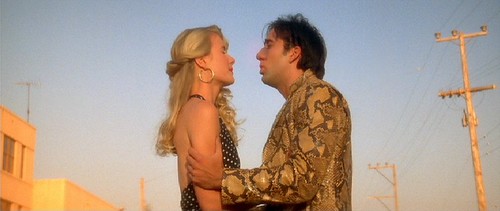
There's a long and boring story about how I saw this movie for the first time, and was really too young and inexperienced to comprehend it. I didn't quickly forget what I saw, but it was a few years before I really "got it" in any profound way. It was my first David Lynch movie. After I saw it the second time, it really clicked for me. In a big, big way. I credit this film almost entirely with my love of cinema. Well, that's kind of a big claim. But it was one of the earlier times when I was really moved by film making and style, as opposed to narrative content.
As a result, there's a special place in my heart reserved for David Lynch's films. They are not subtle in any way, and I really appreciate them for that reason. They are incredibly expressionistic and painterly, completely ridiculous, and at turns satirical or horrific, often both at once.
I have been watching and reading lot of science fiction, lately. I've always loved sci-fi, because it offers unparalleled avenues of confronting current tendencies and fears. And the best of it is grounded in just enough truth that it doesn't seem too fantastic; instead, it seems too real, too close to reality for comfort. It came to me, recently that what makes David Lynch so neat, and what makes his films so great, is that he manages to create an alternate world out of our own. There are no elements in his films that are outside of our experience (excluding Eraserhead, maybe); he just selectively utilizes and warps these elements to turn our experience of the world into a nightmare.
Now that I've seen pretty much the entirety of the Lynch oeuvre, Wild at Heart is still my favorite. With this one performance, Nicolas Cage redeems himself, making up for an entire career of otherwise inconsequential, and, dare I say, worthless, endeavors. (See: City of Angels). Laura Dern, of course, is fabulous in everything. Together, they are oddly unforgettable.
Essentially, Wild at Heart is a road film. Lovers Sailor (Cage) and Lula (Dern) escape together into the American heartland, fleeing Lula's controlling mother (Diane Ladd) and the various goons she has sent out after them. As they go on, the imagery they encounter becomes increasingly dark, and increasingly, they rely on each other to deflect the ugliness of the world.
Somehow, Lynch thought to incorporate parallels with the Wizard of Oz, something which is not in the original Barry Gifford novel. But it really adds something. Lynch subverts the idealistic notion at the center of the Wizard of Oz, that the journey is a necessary tool to uncover what was inside you all along. Then, comes the reward. At the end of Lula and Sailor's journey, instead of the Emerald City, Lula and Sailor find themselves in Big Tuna, Texas, a place that seems a little too much like Purgatory. Instead of a wizard, they are confronted with Bobby Peru (Willem Dafoe), the sardonic embodiment of evil itself. (After a particularly ugly confrontation with him, Lula hysterically clicks her red heels together, but there is no magical escape.)
Watching it this time, I was particularly taken with that one particular allusion to the Wizard of Oz, that what you are searching for is already inside you. Your salvation is inside you, if you acquire the means to access it. This is particularly ominous in the anecdote about Lula's Cousin Dell (Crispin Glover), who slowly went insane before disappearing. Sailor ruminates that things would have been better, if only he could have gotten some good advice from the wizard. The good things are often buried deeply within us, and in the world of Lynch's creation, there is no means of digging them out; the darkness and madness claim us first. This anecdote dimly foreshadows Sailor's fate at the end of the film. In Big Tuna, Bobby Peru convinces a flagging Sailor to rob a bank to get the money he needs to escape. Peru brings out his cowardice and resignation, rather than revealing the heart, brain, or courage that he had all along.
Sailor and Lula exist purely for each other, but there is a sense that even this is a weak foundation. The ending is a happy one, but it's just a bit too sunny for the rest of the film, a bit too exaggerated for us to be confident about the fate of these young lovers.
I really could go on and on about this movie. But I'll stop so I have some material for the next time I watch this. I posted my screen captures earlier, here.

No comments:
Post a Comment